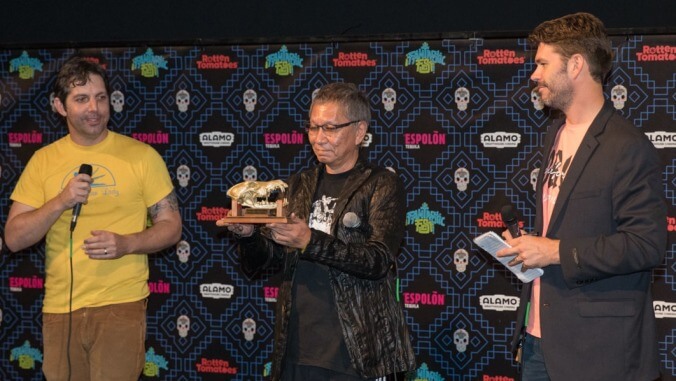Takashi Miike, a golden skull, and the latest Stephen King adaptation open our Fantastic Fest coverage


Most of Fantastic Fest was outside partying with Taika Waititi—who, in classic fashion for a festival that prides itself on its accessibility, spent several hours taking pictures and chatting with people after a screening of his film Jojo Rabbit—but I was inside geeking out over Takashi Miike. The legendary Japanese B-movie director was in town to receive a lifetime achievement award (a.k.a. a gold-painted coyote skull) from the festival, and even though he answered Q&A questions through a translator, his sense of humor translated just fine. Miike, and this is meant as a compliment, is a smartass. And there was a wave of chuckles, first from Miike’s producer Misako Saka, then from his interpreter, then from the audience, as his sarcastic comments were translated from Japanese to English. At one point, his translator grinned as he told the audience that Saka also produces Pokemon movies, and “between [Miike’s] films and the Pokémon films, [they] hope to show Japanese kids a good time.”
Miike also told the audience his new movie, First Love (B+), is a “family film,” which was another joke, of course. (It’s not out of the question, however. Miike’s over 100-film-strong oeuvre does include a handful of kids’ movies alongside shock classics like Ichi The Killer and Audition.) But it is true that, while the film is kinetic, colorful, and frantically paced, it’s also not quite as outrageous as Miike’s gonzo ‘90s yakuza movies. The film ostensibly revolves around a young boxer named Leo (Masataka Kubota), who discovers a new, bold side of himself after being diagnosed with a brain tumor, and Monica (Sakurako Konishi), a meek young woman whose father sold her to the yakuza to pay off his many debts. These young lovers are the Rosencrantz and Guildenstern of a war between Chinese and Japanese gangsters prompted by a botched drug robbery, and the side characters—including bumbling traitor Kase (Shôta Sometani) and revenge-crazed gangland girlfriend Julie (Becky)—are just as dynamic, if not more so, than the romantic leads. The bloodshed is relatively straightforward, but plentiful, culminating in a hardware store shootout that briefly transforms into a motion comic at its climax. For Takashi Miike, maturity is a relative term.
I found First Love hilarious, and its pulpy sensibility made it stand out in a first few days that were heavy on atmospheric slow burns and challenging arthouse fare. (A full review of The Golden Glove will run on The A.V. Club next week, which is a blessing, as it’s the kind of film that demands to be processed slowly.) The only other crowd-pleaser I’ve seen so far is In The Tall Grass (B-), a solid, if ultimately inconsequential, entry into the growing canons of both Netflix movies and Stephen King adaptations. I haven’t read the novella by King and Joe Hill, but knowledgeable sources say the movie’s mean-spirited violence is actually less transgressive than the book. What did make it to the screen is full of classic King-isms, both thematically and in the parking lot full of Easter eggs that sits just outside the eponymous field of grass—which many enter, but no one leaves.
The film was directed by Vincenzo Natali, who also did Cube (2002) and Splice (2009), and the director’s surreal style turned out to be an elevating factor for a story that bends both time and space—a relief after a first act whose bright, flat lighting and broad dialogue screamed “Netflix throwaway.” The big sticking points for me were the CGI blood and Patrick Wilson’s over-the-top performance as one of a handful of travelers trapped in the field, a campy touch that felt out of place in a film whose mind-bending horror is otherwise played straight.
Adoration (B), the new film from Alleluia director Fabrice du Welz, also casts a seductive spell. Shot on grainy, gorgeous Super 16mm, it follows the folie a deux between a schizophrenic girl and a lonely boy, both of them in their early teens, whose puppy love takes a sinister turn when they escape from the mental hospital where Gloria (Fantine Harduin) is imprisoned and Paul’s (Thomas Gioria) mother works. The film flounders a bit in its second half, as it struggles to maintain the tension of its inciting incident. But Harduin’s performance as Gloria goes off her meds and descends into her own private world would be impressive for an actress of any age, let alone a 13-year-old. The dream sequence where Harduin effectively conveys the terrifying depths of her illness with just her unblinking stare will be sticking with me for a while. We’ll see if i still feel that way 15 movies from now, though.